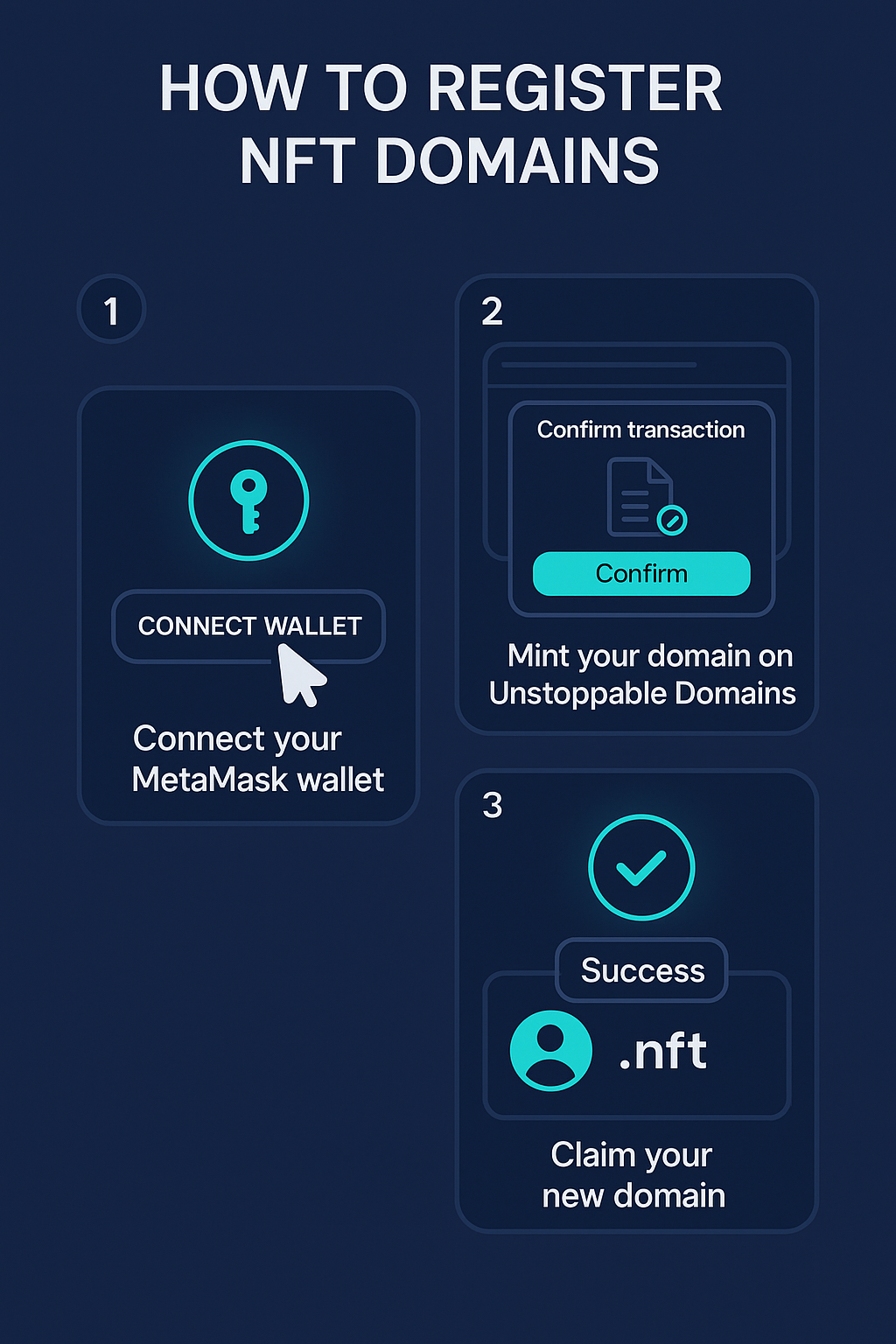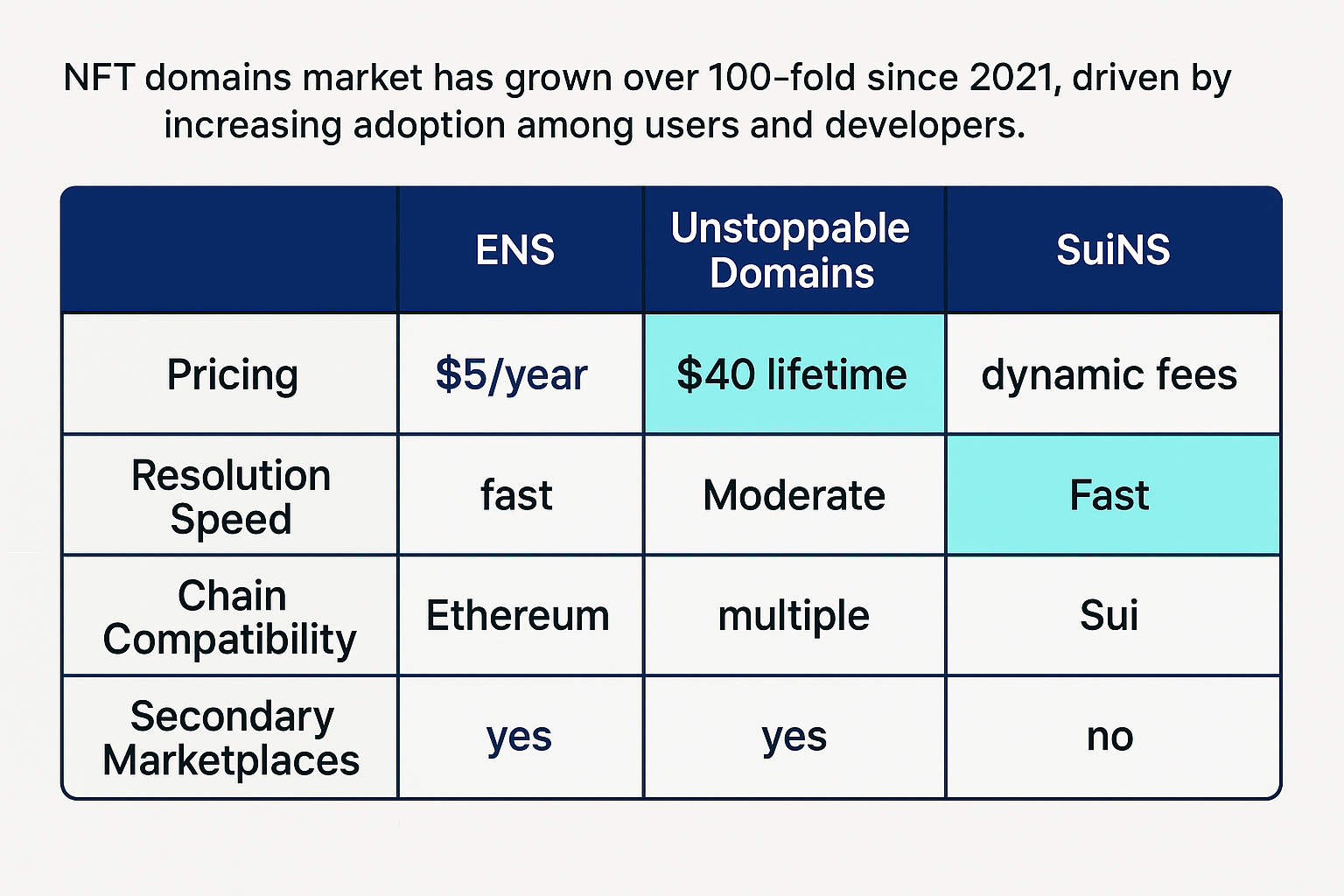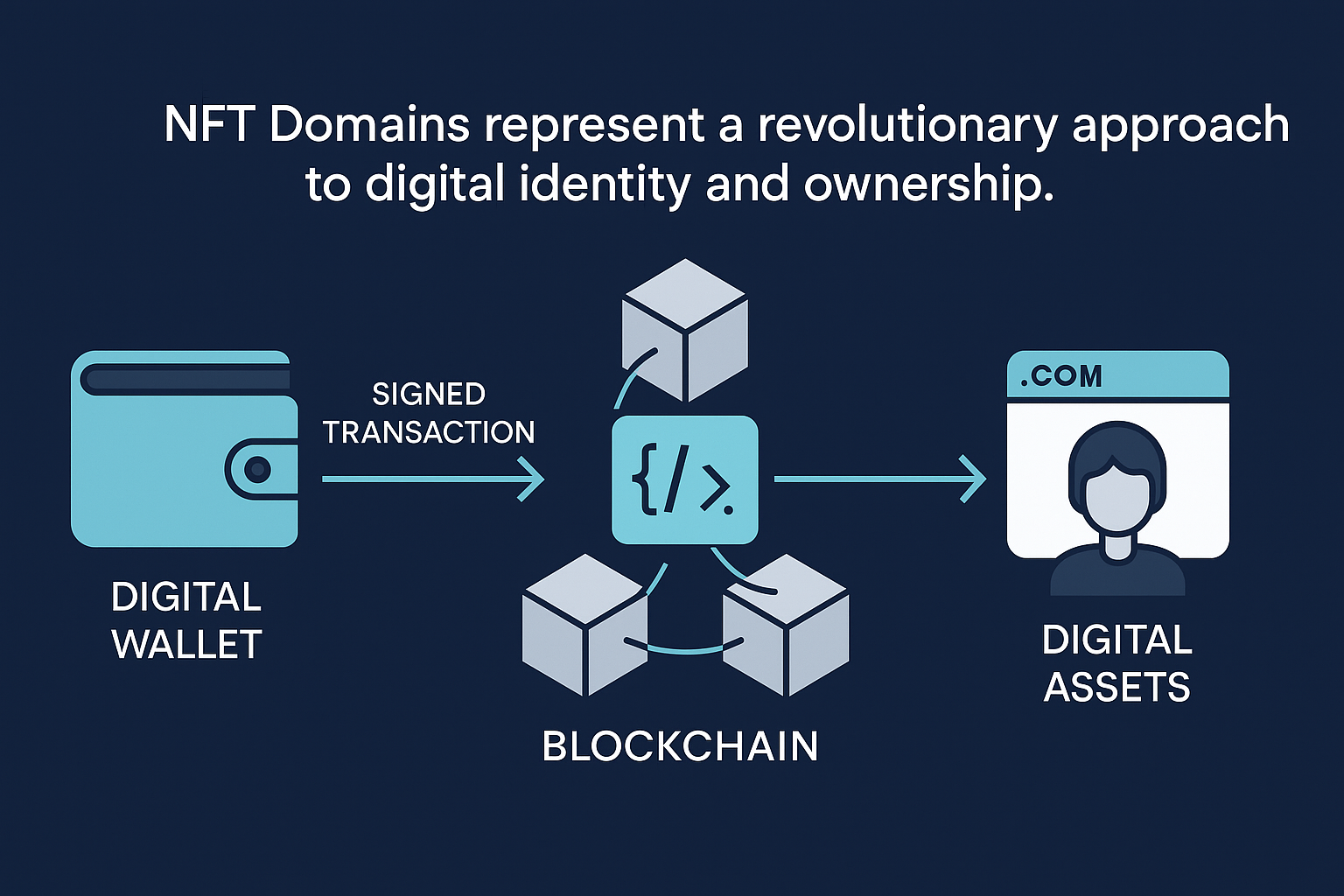Introduction
NFT domains are transforming the landscape of digital identity and ownership by leveraging blockchain technology to create decentralized, secure, and user-controlled domain names. Unlike traditional domains managed centrally by organizations like ICANN, NFT domains provide decentralized domain ownership, empowering individuals across the Web3 spectrum—including digital artists, gamers, marketers, developers, and businesses—to assert full control over their online identities.
What Are NFT Domains?
At their core, NFT domains are domain names minted as Non-Fungible Tokens on blockchain networks such as Ethereum. This means each domain functions as a unique digital asset with ownership recorded securely and transparently on the blockchain. Unlike traditional domains which are leased and can be revoked or censored, NFT domains grant users permanent and tamper-proof rights, merging the concepts of digital identity and asset ownership. They serve as both a website address and a digital identifier that can link to crypto wallets, decentralized applications (dApps), or other online content.
Importance of NFT Domains in Web3
NFT domains represent a fundamental shift in Web3 by offering self-sovereign digital identities. Users no longer depend on centralized authorities to manage or validate their online presence; instead, blockchain technology ensures security, privacy, and interoperability across the decentralized web. For digital artists and marketers, this means more direct engagement with audiences without intermediaries. For gamers and developers, NFT domains enable the creation of branded spaces and community hubs that are censorship-resistant and fully owned. Platforms like hashtag.it.com exemplify this integration by combining web3 domain management with AI and blockchain to promote autonomy and monetization of digital presence.
Table of Contents
- Introduction
- Understanding NFT Domains
- How to Register NFT Domains
- Benefits of NFT Domains
- NFT Domains for Specific Use Cases
- Best Platforms for NFT Domain Registration
Understanding NFT Domains
NFT domains revolutionize digital ownership by combining the uniqueness of NFTs with the functionality of traditional web domains. As blockchain-based domain names, they enable users to own a verifiable and censorship-resistant digital identity.
What Are NFT Domains?
NFT domains are blockchain-based domain names minted as Non-Fungible Tokens (NFTs). Each domain is a unique token on networks like Ethereum, allowing users to control their online identity without intermediaries. These domains can be linked to crypto wallets, decentralized applications, or traditional websites.
Unlike leased DNS domains, NFT domains give permanent ownership recorded on the blockchain ledger. This ownership model provides enhanced security, reduces domain hijacking risk, and supports innovative use cases in Web3 ecosystems.
How NFT Domains Work on Blockchain
NFT domains operate through smart contracts, which automate the ownership transfer and domain management processes. The smart contract stores domain metadata, linking the domain to a user’s digital assets such as wallet addresses or IPFS-hosted websites.
This decentralized system ensures:
- Transparency: Ownership and transaction history are publicly verifiable on-chain.
- Security: Blockchain cryptography prevents unauthorized transfers.
- Interoperability: Domains can interact with multiple decentralized applications seamlessly.
In practical terms, owning an NFT domain allows you to receive cryptocurrency payments using a human-readable address and to host decentralized websites, making digital identity management more accessible and secure.
How to Register NFT Domains

Registering an NFT domain is straightforward yet distinct from traditional domain acquisition. It involves interacting directly with blockchain platforms designed for domain minting.
Choosing the Right Platform
Selecting a platform depends on factors like blockchain compatibility, domain extensions (.eth, .crypto, .sui), user interface, and support for integrations. Top platforms include:
- Ethereum Name Service (ENS): The most popular with broad wallet compatibility.
- Unstoppable Domains: Offers a variety of TLDs with emphasis on censorship resistance.
- Sui Name Service (SuiNS): Newer platform focusing on Sui blockchain domains.
Choosing a platform aligned with your target blockchain and domain goals is essential for long-term usability.
Step-by-Step Registration Process
- Set up a compatible crypto wallet (e.g., MetaMask).
- Connect your wallet to the NFT domain platform.
- Search for your desired domain to check availability.
- Purchase or bid on the domain using cryptocurrency.
- Confirm the transaction and wait for blockchain confirmation.
- Manage your domain via the platform dashboard—link wallets, websites, or profiles.
This process is often supported by detailed tutorials and visual guides to ensure user confidence.
Costs and Fees Associated
NFT domain registration costs vary by platform and TLD. Costs typically include:
- Initial purchase fee: Paid in cryptocurrency.
- Renewal or maintenance fees: Some platforms require annual fees.
- Secondary market fees: When buying domains from other users.
While some platforms charge one-time fees, others operate on subscription models. Always review pricing models before committing.
Benefits of NFT Domains
NFT domains provide several key advantages for owners, enhancing security, permanence, and monetization capabilities.
Ownership Transparency and Security
Blockchain ledger transparency guarantees that NFT domain ownership is visible, traceable, and immutable. Unlike traditional domains, these cannot be arbitrarily revoked or seized by centralized authorities. This provides exceptional security against theft and fraud.
Censorship Resistance and Permanence
Because NFT domains exist on decentralized blockchains, they are inherently resistant to censorship. This permanence ensures that once a domain is minted, its ownership and content linkage remain accessible indefinitely unless transferred by the owner.
Branding and Monetization Opportunities
Owners can leverage NFT domains for branding by creating memorable digital identities easily recognized across platforms. Moreover, there are robust monetization opportunities such as:
- Selling or auctioning valuable domains on NFT marketplaces.
- Leasing domains for advertising or digital storefronts.
- Integrating token gating and royalties for exclusive content.
- Driving traffic to monetized digital assets or services linked to the domain.
These opportunities open new revenue streams for entrepreneurs, artists, and communities.
NFT Domains for Specific Use Cases
NFT domains cater to specialized needs of various Web3 sectors like digital art and gaming.
NFT Domains for Digital Artists’ Portfolios
For digital artists, NFT domains serve as unique branded portals to showcase and protect their art collections. These domains can link directly to decentralized galleries or marketplaces, ensuring:
- Clear proof of ownership and provenance.
- Direct engagement with collectors without intermediaries.
- Opportunities to monetize art portfolios through domain sales or linked NFT transactions.
Platforms supporting artist-centric NFT domains typically offer tools to customize galleries, embed social links, and promote digital works seamlessly.
NFT Domains for Gaming Guild Websites
Gaming guilds benefit from NFT domains by establishing recognizable, immutable digital identities that enhance brand presence across games and metaverse platforms. Benefits include:
- Community trust through verifiable ownership.
- Simplified management of in-game assets and transactions.
- Opportunities for monetization by leasing guild domains or hosting exclusive events.
Registration processes for gaming guilds are similar to individual users, with additional focus on branded naming conventions and integration with guild management tools.
Best Platforms for NFT Domain Registration

Selecting the right platform dramatically affects ease of use, security, and cost.
Leading NFT Domain Platforms Overview
- Ethereum Name Service (ENS): The industry leader with robust ecosystem integration and support for .eth domains.
- Unstoppable Domains: Focused on user-friendly interfaces and censorship-resistant domains with extensions like .crypto.
- Sui Name Service (SuiNS): Emerging platform offering novel blockchain solutions and competitive pricing.
Platform Features Comparison
When choosing a platform, consider:
- User interface intuitiveness.
- Wallet and dApp compatibility.
- Domain transfer ease.
- Security protocols.
- Customer support quality.
Platform Pricing Models
Pricing varies widely. ENS often requires upfront and renewal fees payable in Ethereum, whereas Unstoppable Domains offers one-time purchase options without renewal. Secondary market dynamics also influence costs for premium domains.
Conclusion
NFT domains mark a revolutionary development in digital identity, combining the security and transparency of blockchain technology with the practicality of domain ownership. They empower Web3 users—including artists, gamers, marketers, and enterprises—to create, manage, and monetize their unique online identities without reliance on central authorities. By understanding the ownership mechanics, registration steps, and the broad benefits NFT domains offer, users can confidently navigate the decentralized web.
With platforms like hashtag.it.com advancing web3 domain management, securing an NFT domain becomes an essential step toward digital autonomy and new revenue opportunities. Prospective domain owners should explore registration platforms today to secure their unique presence and partake in the growing Web3 ecosystem.
References
- NFT Domains represent a revolutionary approach to digital identity and ownership
- A comprehensive NFT domains guide
- NFT domains tutorial
- How to get started with NFT domains
- Tips and best practices for NFT domains
- Benefits of NFT domains including ownership transparency and monetization opportunities
- Detailed whitepapers and research on NFT domain systems and challenges
- Industry analysis on NFT domains market growth and adoption
- Expert opinions on the impact and potential of NFT domains in Web3
- Case studies showing real-world use of NFT domains by artists and gaming communities
Explore NFT domain registration platforms today to secure your unique digital identity and unlock new monetization opportunities.

Leave a Reply